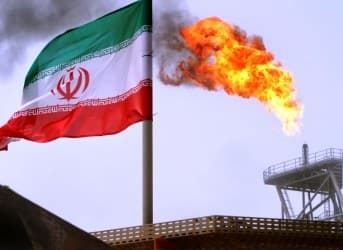With 20 governments expressing their commitment to reduce the amount of crude oil purchased from Iran, the U.S. government said oil production from the Islamic republic was down by 1 million barrels per day from October, compared with the same time last year. Sanctions imposed this year were meant to cut into Iran's oil revenue, which could be financing its nuclear activity. Washington said members of the international community were sending a clear message to Iran that it must come clean on its nuclear ambitions or face "increasing isolation and pressure." A government watchdog report, however, said at least seven companies from countries that received waivers from the U.S. government were still investing in the Iranian oil and natural gas sector.
U.S. Secretary of State Hillary Clinton said China, India, Malaysia, Republic of Korea, Singapore, South Africa, Sri Lanka, Turkey, and Taiwan qualified for a sanctions waiver because of their reductions in crude oil purchases from Iran. Clinton said steady commitments from those countries meant Iranian funding for its nuclear program and "its support for terror(ism)" were curtailed significantly.
"The message to the Iranian regime from the international community is clear: take concrete actions to satisfy the concerns of the international community through negotiations with the P5+1, or face increasing isolation and pressure," she said in a statement.
Related Article: Who Should be Doing the Geopolitical Heavy Lifting in The Middle East?
A report from the Government Accountability Office, however, found that at least seven companies from Asian and African economies were still investing in the Iranian oil and natural gas sector. India's ONGC Videsh was listed by the GAO as an active investor in the Iranian oil sector with a 40-percent stake in the Farsi natural gas block in Iran. The GAO report noted the company's exploration contract there had expired, however. Meanwhile, the China Petroleum and Chemical Corp., known also as Sinopec, holds a majority stake in Iran's Yadavaran onshore oil field and didn't provide a comment to the U.S. government about its ongoing activity in the country.
Iranian officials last week said targeted sanctions were beneficial to a struggling economy that depends, in large part, on oil revenue. A member of the Iranian parliament's National Security and Foreign Policy Commission said Clinton's decision suggested Washington had to "think again" in terms of the consequences that sanctions have for U.S. allies.
Related Article: Tension Escalates in Syria Amid Fears of Chemical Weapons
The Organization of Petroleum Exporting Countries releases its monthly report for December later this week. Since 2010, OPEC shows that crude oil production from Iran has experienced a steady decline. The GAO, for its part, found that while some countries were still investing in Iran, most of the work and trading activity there has remained in the margins. In its report, the GAO said it was the State Department that was responsible for making determinations of what's considered sanctionable activity. But activity in the Iranian energy sector hasn't declined to the point that the country is sidelined completely, as Clinton suggests. Sanctions may be working, however, as witnessed with the collapse of the country's currency this year.
Nevertheless, Iran remains a major oil player despite its controversial nuclear ambitions. According to OPEC, and in the face of tightened sanctions pressure, Iran still managed to hold the No. 5 spot among its member states, just beating Venezuela in terms of October production levels.
By. Daniel J. Graeber of Oilprice.com


















